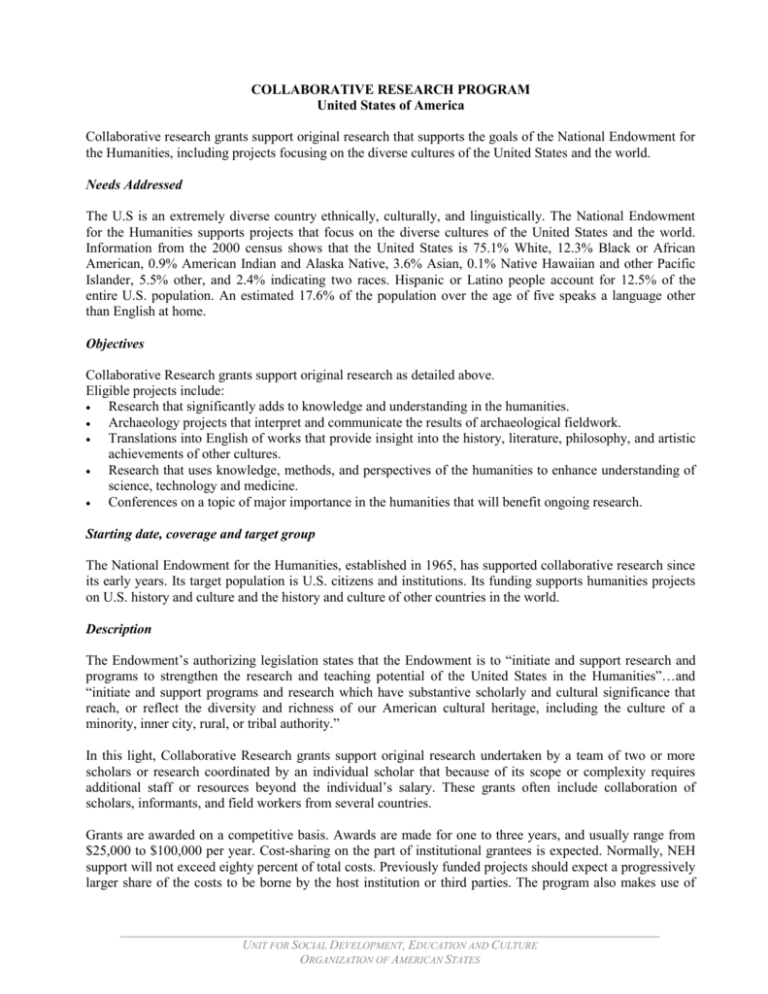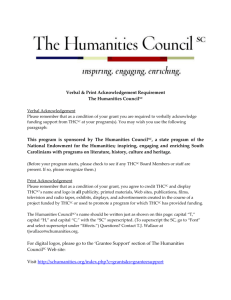collaborative research program - Organization of American States
advertisement

COLLABORATIVE RESEARCH PROGRAM United States of America Collaborative research grants support original research that supports the goals of the National Endowment for the Humanities, including projects focusing on the diverse cultures of the United States and the world. Needs Addressed The U.S is an extremely diverse country ethnically, culturally, and linguistically. The National Endowment for the Humanities supports projects that focus on the diverse cultures of the United States and the world. Information from the 2000 census shows that the United States is 75.1% White, 12.3% Black or African American, 0.9% American Indian and Alaska Native, 3.6% Asian, 0.1% Native Hawaiian and other Pacific Islander, 5.5% other, and 2.4% indicating two races. Hispanic or Latino people account for 12.5% of the entire U.S. population. An estimated 17.6% of the population over the age of five speaks a language other than English at home. Objectives Collaborative Research grants support original research as detailed above. Eligible projects include: Research that significantly adds to knowledge and understanding in the humanities. Archaeology projects that interpret and communicate the results of archaeological fieldwork. Translations into English of works that provide insight into the history, literature, philosophy, and artistic achievements of other cultures. Research that uses knowledge, methods, and perspectives of the humanities to enhance understanding of science, technology and medicine. Conferences on a topic of major importance in the humanities that will benefit ongoing research. Starting date, coverage and target group The National Endowment for the Humanities, established in 1965, has supported collaborative research since its early years. Its target population is U.S. citizens and institutions. Its funding supports humanities projects on U.S. history and culture and the history and culture of other countries in the world. Description The Endowment’s authorizing legislation states that the Endowment is to “initiate and support research and programs to strengthen the research and teaching potential of the United States in the Humanities”…and “initiate and support programs and research which have substantive scholarly and cultural significance that reach, or reflect the diversity and richness of our American cultural heritage, including the culture of a minority, inner city, rural, or tribal authority.” In this light, Collaborative Research grants support original research undertaken by a team of two or more scholars or research coordinated by an individual scholar that because of its scope or complexity requires additional staff or resources beyond the individual’s salary. These grants often include collaboration of scholars, informants, and field workers from several countries. Grants are awarded on a competitive basis. Awards are made for one to three years, and usually range from $25,000 to $100,000 per year. Cost-sharing on the part of institutional grantees is expected. Normally, NEH support will not exceed eighty percent of total costs. Previously funded projects should expect a progressively larger share of the costs to be borne by the host institution or third parties. The program also makes use of ______________________________________________________________________________________ UNIT FOR SOCIAL DEVELOPMENT, EDUCATION AND CULTURE ORGANIZATION OF AMERICAN STATES offers of federal matching funds, These funds are released when a grantee secures gift funds from eligible third parties. The use of matching offers encourages private sector support for humanities research. Financing sources Funding for Collaborative Research grants comes from the Endowment’s annual Congressional appropriation. Strengths of the program Publication in print, digital, or video form is the usual product of every Collaborative Research Grant. The Collaborative Research program has supported a large number of projects that involved international cooperation. Achievements The program has a strong record of significant contributions to research and expanding knowledge in the humanities, evident in the publications resulting from grant-supported projects. Numerous projects funded through the Collaborative Research program have resulted in prize-winning books. Challenges Future funding is dependent on Congressional appropriations. Recommendations regarding its potential transference to other contexts The application and review procedures used in the Collaborative Research program are used in all Endowment programs and are adaptable to other contexts. ______________________________________________________________________________________ UNIT FOR SOCIAL DEVELOPMENT, EDUCATION AND CULTURE ORGANIZATION OF AMERICAN STATES






